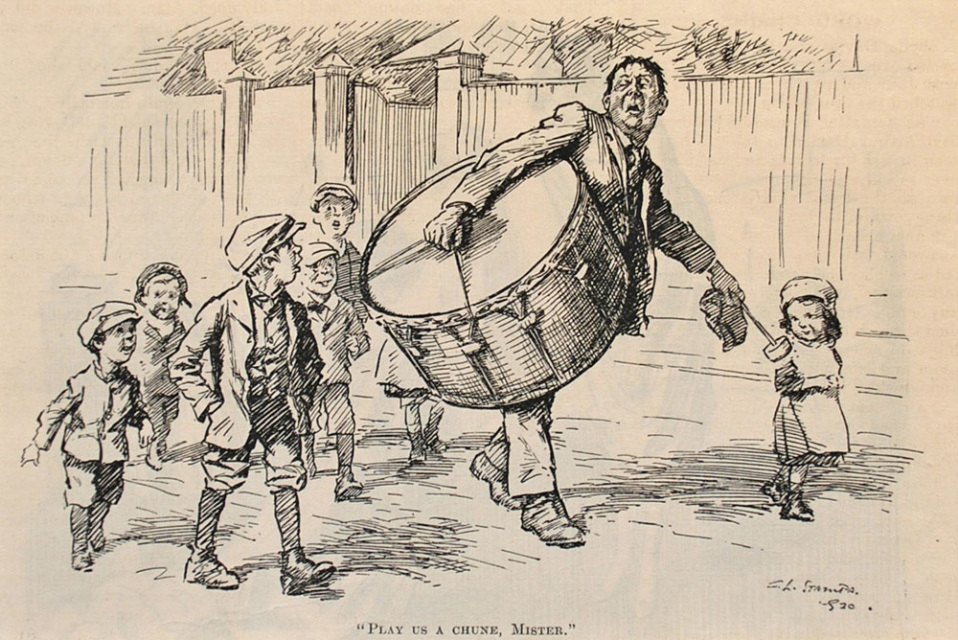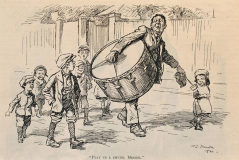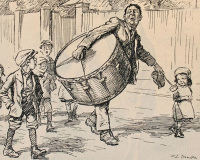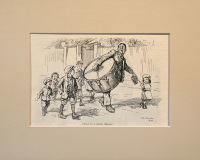- Decorative
- >
- Punch Cartoons
- >
- Play us a Chune, Mister, 1920
Play us a Chune, Mister, 1920
SKU:
p20a1
£17.99
£17.99
Unavailable
per item
G L Stampa (1875-1951)
Cartoon taken from a disbound copy of the Punch Almanack, 1920
In a cream conservation grade mount (matt)
In very good condition, as illustrated
Cartoon: 11.6 x 17.6 cm (visible); mount: 20.4 x 25.4 cm (8" x 10")
Visit our Frames page to view and select a frame for this work
Cartoon taken from a disbound copy of the Punch Almanack, 1920
In a cream conservation grade mount (matt)
In very good condition, as illustrated
Cartoon: 11.6 x 17.6 cm (visible); mount: 20.4 x 25.4 cm (8" x 10")
Visit our Frames page to view and select a frame for this work
1 available
George Loraine Stampa (1875-1951)
Stampa was born in Turkey and studied art at Heatherley’s School and at the Royal Academy Schools (alongside fellow Punch contributors William Heath Robinson and Lewis Baumer). His first Punch cartoon was published in 1894.
In his history of the magazine, Price (1957) gives a flavour of the man and his work: ‘On sheer bulk of work and on social closeness to the Punch circle G L Stampa merits mention. Short of being actually on the Table [that is a senior member of staff] he was as much of a Punch man as any one has been. Roué, bohemian, raconteur, link with the days of Phil May and tremendous evenings in hansom cabs, he lived entirely in the past, refusing to have a newspaper or to recognise any change since… the date varied from conversation to conversation… He spanned an immense period, from 1894 to 1950, and his work included, as well as jokes about street arabs and cockneys at the seaside and servant girls, the theatre drawings and initial letters. In early subject-matter he was influenced by Phil May and he has preserved the appearances of the Gaiety chorus-girl and the bohemian life of the time.’
Collections
Ashmolean Museum, Oxford
British Museum
Cartoon Art Trust
University of Kent Cartoon Collection
Victoria and Albert Museum
Sources and further reading
Bryant M and Heneage S (1994), Dictionary of British Cartoonists and Caricaturists 1730-1980, Scolar Press
Dolman B (1981), A Dictionary of British Artists, 1929, Antique Collectors’ Club
Johnson J and Greutzner A (1999), British Artists 1880-1940, Antique Collectors’ Club
Price R G G (1957), A History of Punch, Collins
Waters G M (1975), Dictionary of British Artists 1900-1950, Eastbourne Fine Art
Stampa was born in Turkey and studied art at Heatherley’s School and at the Royal Academy Schools (alongside fellow Punch contributors William Heath Robinson and Lewis Baumer). His first Punch cartoon was published in 1894.
In his history of the magazine, Price (1957) gives a flavour of the man and his work: ‘On sheer bulk of work and on social closeness to the Punch circle G L Stampa merits mention. Short of being actually on the Table [that is a senior member of staff] he was as much of a Punch man as any one has been. Roué, bohemian, raconteur, link with the days of Phil May and tremendous evenings in hansom cabs, he lived entirely in the past, refusing to have a newspaper or to recognise any change since… the date varied from conversation to conversation… He spanned an immense period, from 1894 to 1950, and his work included, as well as jokes about street arabs and cockneys at the seaside and servant girls, the theatre drawings and initial letters. In early subject-matter he was influenced by Phil May and he has preserved the appearances of the Gaiety chorus-girl and the bohemian life of the time.’
Collections
Ashmolean Museum, Oxford
British Museum
Cartoon Art Trust
University of Kent Cartoon Collection
Victoria and Albert Museum
Sources and further reading
Bryant M and Heneage S (1994), Dictionary of British Cartoonists and Caricaturists 1730-1980, Scolar Press
Dolman B (1981), A Dictionary of British Artists, 1929, Antique Collectors’ Club
Johnson J and Greutzner A (1999), British Artists 1880-1940, Antique Collectors’ Club
Price R G G (1957), A History of Punch, Collins
Waters G M (1975), Dictionary of British Artists 1900-1950, Eastbourne Fine Art



